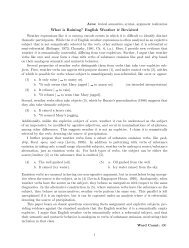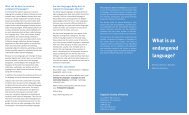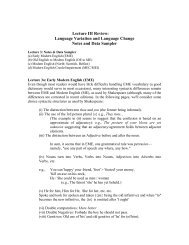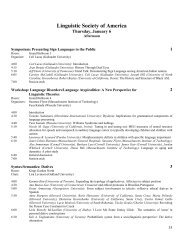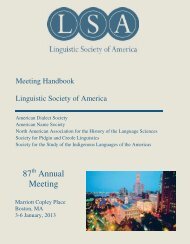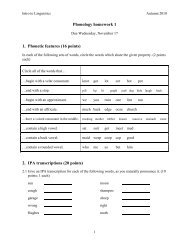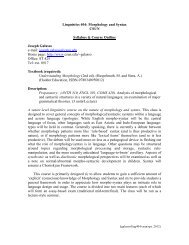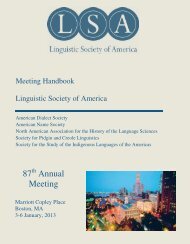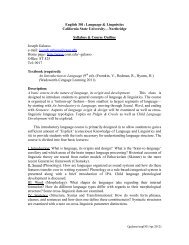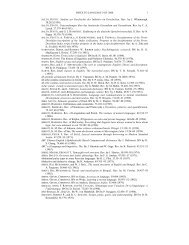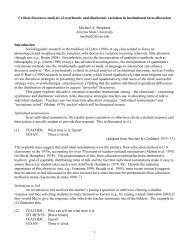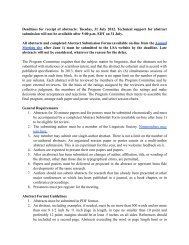Judith Tonhauser (Ohio State University) Session 28Tense or grammatical aspect? Guarani nominal temporal suffixesGuarani has nominal temporal markers that have been suggested to be nominal tenses (e.g. Nordlinger & Sadler 2004). I propose fivecriteria for distinguishing tense and grammatical aspect and, on <strong>the</strong> basis <strong>of</strong> data collected during fieldwork in Paraguay, argue that <strong>the</strong>Guarani nominal markers are not tenses but grammatical aspect/modality markers. The criteria are derived from <strong>the</strong> core meaning <strong>of</strong>tense (as a relation between two times) and grammatical aspect (as an operation on eventuality/nominal descriptions) and are, hence,compatible with <strong>the</strong> major semantic <strong>the</strong>ories <strong>of</strong> temporality.Maziar Azumi Toosarvandani (University <strong>of</strong> California, Berkeley) WITHDRAWN Session 36Deverbal nominalization in Nor<strong>the</strong>rn PaiuteMaziar Azumi Toosarvandani (University <strong>of</strong> California, Berkeley) Session 101From nominalizer to absolutive suffix: Archaism & innovation in NumicThe Numic branch <strong>of</strong> <strong>the</strong> Uto-Aztecan (UA) language family displays a number <strong>of</strong> idiosyncratic features, some <strong>of</strong> which have beenargued to be conservative features <strong>of</strong> UA lost in all non-Numic languages, e.g. final features (Nichols 1973). I propose that Numic isconservative in ano<strong>the</strong>r respect, its use, as a deverbal nominalizer and relativizer, <strong>of</strong> <strong>the</strong> suffix -t1 which in <strong>the</strong> non-Numic UAlanguages has been grammaticalized as an absolutive suffix. This proposal is significant for <strong>the</strong> long-standing debate over whe<strong>the</strong>rNumic, Tübatulabal, Hopi, and Takic subgroup into a Nor<strong>the</strong>rn UA branch (Kroeber 1907 and o<strong>the</strong>rs) or not (Whorf 1935 and o<strong>the</strong>rs).Anna Marie Trester (Georgetown University) Session 19Oh-prefacing in quotatives: Implications for speaker stance, alignment, & styleCurrent variationist sociolinguistic research into quoted speech has focused almost exclusively on <strong>the</strong> role <strong>of</strong> quotative verbs but hastended to neglect <strong>the</strong> quoted material itself in conveying stance or information about <strong>the</strong> speaker's affective or epistemic orientation(Bucholtz 2004, Bakhtin 1981). My research addresses this gap by focusing on <strong>the</strong> structural and interactional functions <strong>of</strong> <strong>the</strong>discourse marker oh when used to preface quoted speech. I build on discourse analytic research into oh as a mechanism fornegotiating speaker/hearer alignment in interaction (Schiffrin 1987, Heritage 1998), contextualizing this against a quantitativeinvestigation <strong>of</strong> this speaker's stylistic use <strong>of</strong> quotation.Celina Troutman (Northwestern University) Session 3Brady Clark (Northwestern University)Matt Goldrick (Northwestern University)Variation & social networks during language changeSocial networks play a fundamental role in language change and variation (Milroy & Milroy 1985, Eckert 2000). In particular, Nettle1999 argues that <strong>the</strong>y solve <strong>the</strong> ‘threshold problem’--how rare linguistic variants can spread through a community (Sapir 1921).Previous studies (Nettle 1999) <strong>of</strong> <strong>the</strong> threshold problem have focused on learners with categorical grammars. However, such learnerscannot demonstrate intraspeaker variation during language change (Weinreich, Labov, & Herzog 1968). We show that although asocial network model (Barabási & Albert 1999) <strong>of</strong> learners with probabilistic grammars (Yang 2002) can account for intraspeakervariation, it cannot solve <strong>the</strong> threshold problem.Benjamin V. Tucker (University <strong>of</strong> Arizona) Session 100Acoustic phonetic description <strong>of</strong> ChemehueviPhonetic investigation <strong>of</strong> Uto-Aztecan languages is sparse. Here I provide a phonetic description <strong>of</strong> Chemehuevi, a sou<strong>the</strong>rn Numiclanguage <strong>of</strong> <strong>the</strong> Shoshonean branch <strong>of</strong> Uto-Aztecan. Previous work on Chemehuevi describes <strong>the</strong> phonology but not <strong>the</strong> phonetics(Press 1974, 1979; Major 2005). My phonetic investigation addresses <strong>the</strong> following issues raised in previous descriptions <strong>of</strong> <strong>the</strong>phonology: (1) What is <strong>the</strong> relation between use <strong>of</strong> coronal fricatives and affricates? (2) How vowels are distributed across speakers?(3) Does Chemehuevi have an /e/ phoneme? (4) Are <strong>the</strong>re word-final voiceless vowels? This study <strong>of</strong>fers a qualitative andquantitative phonetic description <strong>of</strong> Chemehuevi.Alina Twist (University <strong>of</strong> Arizona) Session 22Experimental evidence for <strong>the</strong> productivity <strong>of</strong> nonconcatenative morphology in MalteseAn elicitation experiment was designed to measure <strong>the</strong> relative productivity <strong>of</strong> nonconcatenative morphology in Maltese. Results169
show that both concatenative and nonconcatenative verb formation strategies are productive. Factors that influence verb shape include<strong>the</strong> prosodic structure <strong>of</strong> <strong>the</strong> borrowed item and whe<strong>the</strong>r or not it has obviously foreign segmental elements. However, linguisticstructure alone does not account for <strong>the</strong> type <strong>of</strong> verb formation that is applied. There also appears to be an element <strong>of</strong> optionality inword formation strategy, revealing that both <strong>the</strong> expected Semitic borrowing pattern and nonnative suffixing are productive.Cherlon Ussery (University <strong>of</strong> Massachusetts, Amherst) Session 25AGREE to control: Case optionality in IcelandicI propose an analysis <strong>of</strong> control in which case is optionally transmitted from <strong>the</strong> controller to PRO. Evidence from Icelandic suggeststhat while PRO necessarily inherits <strong>the</strong> controller's phi features, PRO optionally inherits <strong>the</strong> controller's case feature. I argue that thisoptionality is derived from <strong>the</strong> ‘timing’ <strong>of</strong> <strong>the</strong> controller-PRO AGREE relation. If AGREE is established after <strong>the</strong> controller has beencase-marked, PRO inherits <strong>the</strong> case and phi features <strong>of</strong> <strong>the</strong> controller. If AGREE is established before <strong>the</strong> controller has been casemarked,PRO inherits only <strong>the</strong> controller's phi features and PRO bears nominative by default.Kristin J. Van Engen (Northwestern University) Session 45Pronouns in coordination: Effects <strong>of</strong> modality, grammatical weight, & information structureI investigate variation in <strong>the</strong> usage <strong>of</strong> first-person, subject-position coordinated pronouns in <strong>America</strong>n English. In particular, I focuson <strong>the</strong> roles <strong>of</strong> linguistic modality, grammatical weight, and <strong>the</strong> information structure status <strong>of</strong> elements conjoined with pronouns aspotential factors in conditioning <strong>the</strong> usage <strong>of</strong> <strong>the</strong> different variants (X and I, X and me, I and X, me and X). Corpus analysis resultsshow differences in usage across speech and writing, as well as significant effects <strong>of</strong> <strong>the</strong> grammatical weight and information status <strong>of</strong><strong>the</strong> conjoined elements.Gerard Van Herk (Memorial University <strong>of</strong> Newfoundland) Session 91Questioning question formation research in Early African <strong>America</strong>n EnglishIn Early African <strong>America</strong>n English (AAE) questions, noninversion <strong>of</strong> <strong>the</strong> verbal auxiliary (Where your riches is?) has been taken asevidence <strong>of</strong> ei<strong>the</strong>r a creole origin (DeBose 1995) or an extension <strong>of</strong> earlier English do-support constraints (Van Herk 2000). I useAAE diaspora data to investigate <strong>the</strong> constraints on auxiliary-less questions (Where you-all come from?), which may reflect ei<strong>the</strong>rauxiliary deletion or noninversion <strong>of</strong> verbs unmarked for tense or agreement (Rickford 2005). I demonstrate <strong>the</strong> utility <strong>of</strong> <strong>the</strong>comparative method in determining verbal function and suggest methodological implications for <strong>the</strong> study <strong>of</strong> o<strong>the</strong>r varieties.Gerard Van Herk (Memorial University <strong>of</strong> Newfoundland) Session 61Adrienne Jones (University <strong>of</strong> Ottawa)Ethnic & national self-reference among 19th-century African <strong>America</strong>nsTo investigate <strong>the</strong> ethnic naming practices and motivations <strong>of</strong> everyday antebellum African <strong>America</strong>ns, we extract all ethnonyms forpeople <strong>of</strong> color--including colored, black, Negro, brethren, African, Sons <strong>of</strong> Ham, and Ethiop(ian)--from 427 letters from African<strong>America</strong>ns settling in Liberia (1834-1866.) We demonstrate how settlers deployed this repertoire to situate <strong>the</strong>mselves relative to<strong>America</strong>ns (Black and White), native Africans, and <strong>the</strong>ir ancestors, and to claim social and political capital. We suggest that settlers'frequent use <strong>of</strong> brethren as an ethnonym reflects indirection as a discourse strategy and suggests a deeper history for <strong>the</strong> contemporaryethnonyms bro<strong>the</strong>r/sister.Sarah VanWagenen (University <strong>of</strong> California, Los Angeles) Session 26Exploiting surface cues in grammar inductionI characterize <strong>the</strong> nature <strong>of</strong> structural information that can be extracted from string percepts, i.e., independent <strong>of</strong> semantic/contextualinformation. I consider symbolic markers analogous to case and agreement markers. Tree transducers analogous to case/agreementmarking systems and word order manipulations are applied to derivations <strong>of</strong> a restricted class <strong>of</strong> context free grammars called ‘verysimple grammars’ (VSGs) resulting in an expanded class. Learners are defined which exploit <strong>the</strong> surface cues introduced by <strong>the</strong> treetransducers and learn <strong>the</strong> expanded classes, demonstrating that at least some information about constituency and predicate-argumentrelations can be gleaned from distributional information.Tonjes Veenstra (Zentrum für Allgemeine Sprachwissenschaft, Berlin) Session 82Creoles as beyond <strong>the</strong> basic varietiesNew languages tend to emerge in multilingual contact situations, creoles being one <strong>of</strong> <strong>the</strong> prime examples. Much <strong>of</strong> <strong>the</strong> recent170
- Page 1:
MEETING HANDBOOKLINGUISTIC SOCIETY
- Page 5 and 6:
Meeting RoomsSECOND FLOORFOURTH FLO
- Page 7:
• LSA: Business Meeting and Award
- Page 11 and 12:
LSAThursday, 4 JanuaryEveningWelcom
- Page 13 and 14:
Friday MorningLSAConstructions and
- Page 15 and 16:
LSAFriday, 5 JanuaryAfternoonInvite
- Page 17 and 18:
Friday AfternoonLSAModeling Acquisi
- Page 19 and 20:
LSARules for Motions and Resolution
- Page 24 and 25:
LSASaturday AfternoonSymposium: Par
- Page 26 and 27:
LSASaturday AfternoonSyntactic Face
- Page 28 and 29:
LSASunday MorningFirst Language Acq
- Page 30 and 31:
American Dialect SocietyThursday, 4
- Page 32 and 33:
ADSSaturday, 6 JanuaryMorningSessio
- Page 34 and 35:
American Name SocietyThursday, 4 Ja
- Page 36 and 37:
ANSFriday AfternoonForms of Address
- Page 38 and 39:
ANSSaturday AfternoonHistorical Ono
- Page 40 and 41:
Society for Pidgin and Creole Lingu
- Page 42 and 43:
SPCLSaturday, 6 JanuaryMorningSpeci
- Page 44 and 45:
Society for the Study of the Indige
- Page 46 and 47:
SSILAFriday AfternoonPhonology and
- Page 48 and 49:
SSILASunday, 7 JanuaryMorningSemant
- Page 50 and 51:
Part 1: Thursday, 4 JanuaryPart 2:
- Page 52 and 53:
Donca Steriade (Massachusetts Insti
- Page 54 and 55:
Friday, 5 JanuaryPlenary AddressCal
- Page 56:
Saturday, 6 JanuaryPresidential Add
- Page 59 and 60:
Thursday, 4 JanuaryTutorialA Field
- Page 61 and 62:
Thursday, 4 JanuarySymposiumContinu
- Page 63 and 64:
Friday, 5 JanuarySymposiumApproache
- Page 65 and 66:
Friday, 5 JanuaryDigital Poster Ses
- Page 67 and 68:
Stephen R. Anderson (Yale Universit
- Page 69 and 70:
David Bowie (University of Central
- Page 71 and 72:
Sharon Peperkamp (CNRS/University o
- Page 73 and 74:
Elena Guerzoni (University of South
- Page 75 and 76:
Claire Bowern (Rice University)Morp
- Page 77 and 78:
Lise Dobrin (University of Virginia
- Page 79 and 80:
We discuss the analysis of the vowe
- Page 81 and 82:
Brian Agbayani (California State Un
- Page 83 and 84:
squiggly shapes). Disfluency made n
- Page 85 and 86:
Adam Baker (University of Arizona)
- Page 87 and 88:
final particle; this structure enco
- Page 89 and 90:
Travis G. Bradley (University of Ca
- Page 91 and 92:
demonstrated that 2-year-olds map n
- Page 93 and 94:
Nancy J. Caplow (University of Cali
- Page 95 and 96:
Sarah Churng (University of Washing
- Page 97 and 98:
Jennifer Culbertson (Johns Hopkins
- Page 99 and 100:
Scott Drellishak (University of Was
- Page 101 and 102: Marc Ettlinger (University of Calif
- Page 103 and 104: Scherre 2001 argue that the phenome
- Page 105 and 106: Cynthia A. Fox (University at Alban
- Page 107 and 108: structures to the double object con
- Page 109 and 110: Steven Gross (East Tennessee State
- Page 111 and 112: Heidi Harley (University of Arizona
- Page 113 and 114: equivalents. I argue that their sim
- Page 115 and 116: predictable, and/or restricted in d
- Page 117 and 118: Keith Johnson (University of Arizon
- Page 119 and 120: Andrew Kehler (University of Califo
- Page 121 and 122: comparative rate of acquisition acr
- Page 123 and 124: Pei-Jung Kuo (University of Connect
- Page 125 and 126: EunHee Lee (University at Buffalo,
- Page 127 and 128: Brook Danielle Lillehaugen (Univers
- Page 129 and 130: Martha J. Macri (University of Cali
- Page 131 and 132: Spanish subjects with unaccusative
- Page 133 and 134: Brad Montgomery-Anderson (Universit
- Page 135 and 136: multi-ethnic configuration, and pos
- Page 137 and 138: Natalie Operstein (University of Ca
- Page 139 and 140: Nick Pharris (University of Michiga
- Page 141 and 142: Anastasia Riehl (Cornell University
- Page 143 and 144: Françoise Rose (CNRS-IRD) Session
- Page 145 and 146: precedence also constrains stative
- Page 147 and 148: use experimental and corpus techniq
- Page 149 and 150: eads easily for astrophysicists.).
- Page 151: domains of use are mostly complemen
- Page 155 and 156: Don Walicek (University of Puerto R
- Page 157 and 158: positions. However, certain matrix
- Page 159 and 160: Suwon Yoon (University of Chicago)



